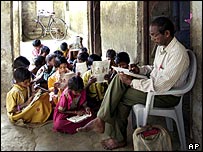Untitled Document
 |
Worldwide, 100 million children are not receiving a primary education |
High levels of illiteracy are hindering attempts to erase world poverty,
the United Nations education agency warns.
Not only is one fifth of the world's adult population illiterate, but 100 million
children are not attending primary school, the Unesco report says.
The situation presents a "severe violation of rights and a brake on all
aspects of development", says Unesco's fourth Education for All report.
And the typical 1% of education budgets set aside for literacy "must rise".
The report estimates an additional US$2.5bn (£1.4bn) needs to be spent
each year if goals to achieve a 50% improvement in adult literacy are to be
reached by 2015.
Unesco says governments and aid agencies must allocate more cash for youth
and adult literacy programmes, as well as expanding quality primary and lower-secondary
education.
While there is increasing backing for universal primary education, literacy is
not high on the agenda of countries that give aid to other countries, the report
says.
"Few bilateral donors and development banks make explicit reference to
literacy in their aid policies."
The report says literacy is crucial if individuals are to participate in political,
social and economic life.
And it points to links between better literacy and improved health, family
planning and HIV/Aids prevention.
"The groundswell for halving the number of people living in extreme poverty
in the next decade must translate into long-term commitments that recognise
the indispensable role that education - with literacy at its core - plays in
bettering the lives of individuals, their communities and nations," the
report concludes.
Gender inequality
The regions found to have the lowest levels of literacy are sub-Saharan Africa,
south and west Asia and the Arab states, where only 60% of the population are
able to read and write.
Women remain more at risk of illiteracy, with only 88 women worldwide considered
literate for every 100 men.
In Bangladesh and Pakistan, these figures are even less, at 62 and 57 respectively
for every 100 men.
The Global Campaign for Education (GCE) welcomed the publication and its focus
on adult literacy, saying illiteracy was a violation of the fundamental human
right to education.
David Archer from the GCE said: "Literacy is the fertilizer needed for
development and democracy to take root and grow.
"It is the invisible ingredient in any successful strategy for eradicating
poverty. Unfortunately, in recent years it has become all too invisible."

